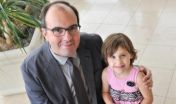(Press-News.org) Osteoporosis drugs known as bisphosphonates may not protect women from breast cancer as had been thought, according to a new study led by researchers at UC San Francisco (UCSF).
The drugs' protective effect was widely assumed after several observational studies showed that women who took them were less likely to get breast cancer.
But when researchers assessed the effect of two of the most widely used osteoporosis drugs – sold under the brand names, Fosamax and Reclast – in two large randomized clinical trials, neither drug protected women with osteoporosis from getting breast cancer. The results were published August 11, 2014, in JAMA Internal Medicine.
The researchers said the link found in the previous observational studies between taking the drugs and having a lower incidence of breast cancer may be due to a third factor, low estrogen.
Since having low estrogen both weakens bones and protects against most breast cancers, the women most likely to be prescribed drugs for osteoporosis are usually also at lower risk for breast cancer.
"They may have seen a lower risk of breast cancer in women using bisphosphonates in the earlier observational studies because those women had a lower risk of breast cancer to begin with," said Trisha Hue, PhD, lead author of the study.
"Post-menopausal women with osteoporosis usually have low estrogen levels," said Hue, an epidemiologist with the San Francisco Coordinating Center, a partnership between the CPMC Research Institute and the UCSF Department of Epidemiology & Biostatistics. "Lower levels of estrogen are strongly associated with a lower risk of breast cancer."
Steven Cummings, MD, a co-author of the paper, a UCSF emeritus professor of medicine and director of the San Francisco Coordinating Center, said women should not take these drugs thinking they will protect them from breast cancer.
"Post-menopausal women should continue taking these drugs for the prevention of fractures, but they should not use bisphosphonates for the prevention of primary breast cancer," said Cummings, also a senior scientist at the CPMC Research Institute.
The data analyzed in the study came from two double blind, placebo controlled clinical trials. In both trials, women who received bisphosphonates had a slightly higher but statistically non-significant incidence of breast cancer.
The Fracture Intervention Trial (FIT) randomly assigned 6,459 women from the United States aged 55 to 81 to alendronate or a placebo for an average follow up of 3.8 years; 1.8 percent of the women who received the drug developed breast cancer, while 1.5 percent of those given a placebo developed the disease.
The Health Outcomes and Reduced Incidence with Zoledronic Acid Once Yearly-Pivotal Fracture Trial (HORIZON-PFT) randomly assigned 7,765 women from the United States, Canada, Asia, Europe and South America aged 65 to 89 to annual intravenous zoledronic acid or a placebo for an average follow up of 2.8 years; .87 percent of women who received the drug developed breast cancer, while .77 percent of those given a placebo developed the disease.
Women in either study who had recurrent breast cancer or reported a history of breast cancer were excluded from the analysis.
INFORMATION:
Other authors include Jane Cauley, DrPH, of the University of Pittsburgh; Douglas Bauer, MD, of UCSF; Kristine Ensrud, MD, of the University of Minnesota; Elizabeth Barrett-Connor, MD, of UC San Diego; and Dennis Black, PhD, of UCSF.
FIT was supported by Merck & Co., USA. HORIZON-PFT was supported by Novartis Pharma in Basel, Switzerland. Neither company was involved in the analysis or interpretation of the data for the manuscript or the decision to submit it for publication. The analysis was designed and conducted by non-Merck/non-Novartis investigators without additional financial support.
UCSF is the nation's leading university exclusively focused on health. Now celebrating the 150th anniversary of its founding as a medical college, UCSF is dedicated to transforming health worldwide through advanced biomedical research, graduate-level education in the life sciences and health professions, and excellence in patient care. It includes top-ranked graduate schools of dentistry, medicine, nursing and pharmacy; a graduate division with world-renowned programs in the biological sciences, a preeminent biomedical research enterprise and two top-tier hospitals, UCSF Medical Center and UCSF Benioff Children's Hospital San Francisco. Please visit http://www.ucsf.edu.
Bone drugs may not protect osteoporotic women from breast cancer
New analysis of clinical trial data by UCSF-led team suggests earlier evidence was misleading
2014-08-11
ELSE PRESS RELEASES FROM THIS DATE:
Novel study maps infant brain growth in first 3 months of life using MRI technology
2014-08-11
A recent study conducted by researchers at the University of California, San Diego School of Medicine and the University of Hawaii demonstrates a new approach to measuring early brain development of infants, resulting in more accurate whole brain growth charts and providing the first estimates for growth trajectories of subcortical areas during the first three months after birth. Assessing the size, asymmetry and rate of growth of different brain regions could be key in detecting and treating the earliest signs of neurodevelopmental disorders, such as autism or perinatal ...
Gloves after hand washing associated with fewer infections in preterm babies
2014-08-11
Extremely premature babies in a neonatal intensive care unit (NICU) had fewer infections when medical staff wore gloves after washing their hands compared with hand washing alone.
The author is David A. Kaufman, M.D., of the University of Virginia School of Medicine, Charlottesville, and colleagues.
Late-onset infections (more than 72 hours after birth) and necrotizing enterocolitis (NEC, tissue death in the intestines) can cause death and neurodevelopmental impairment in extremely premature babies. Even after hand washing, medical staff can still have microorganisms ...
Normal cognition in patient without apolipoprotein E, risk factor for Alzheimer's
2014-08-11
A 40-year-old California man exhibits normal cognitive function although he has no apolipoprotein E (apoE), which is believed to be important for brain function but a mutation of which is also a known risk factor for Alzheimer disease (AD). Researchers suggest this could mean that therapies to reduce apoE in the central nervous system may one day help treat neurodegenerative disorders such as AD.
The study was authored by Angel C. Y. Mak, Ph.D., of the University of California, San Francisco, and colleagues.
The patient was referred to UCSF with severe high cholesterol ...
Bisphosphonates for osteoporosis not associated with reduced breast cancer risk
2014-08-11
An analysis of data from two randomized clinical trials finds that three to four years of treatment with bisphosphonates to improve bone density is not linked to reduced risk of invasive postmenopausal breast cancer.
The authors are Trisha F. Hue, Ph.D., M.P.H., of the University of California, San Francisco, and colleagues.
Some studies have suggested that bisphosphonates, which are commonly used to treat osteoporosis, may have antitumor and antimetastatic properties. Some observational studies have suggested bisphosphonates may protect women from breast cancer. ...
Medicinal oil reduces debilitating epileptic seizures associated with Glut 1 deficiency
2014-08-11
DALLAS – Aug. 11, 2014 – Two years ago, the parents of Chloe Olivarez watched painfully as their daughter experienced epileptic seizures hundreds of times a day. The seizures, caused by a rare metabolic disease that depleted her brain of needed glucose, left Chloe nearly unresponsive, and slow to develop.
Within hours, treatment with an edible oil dramatically reduced the number of seizures for then-4-year-old Chloe, one of 14 participants in a small UT Southwestern Medical Center clinical trial.
"Immediately we noticed fewer seizures. From the Chloe we knew two years ...
An easier way to manipulate malaria genes
2014-08-11
Plasmodium falciparum, the parasite that causes malaria, has proven notoriously resistant to scientists' efforts to study its genetics. It can take up to a year to determine the function of a single gene, which has slowed efforts to develop new, more targeted drugs and vaccines.
MIT biological engineers have now demonstrated that a new genome-editing technique, called CRISPR, can disrupt a single parasite gene with a success rate of up to 100 percent — in a matter of weeks. This approach could enable much more rapid gene analysis and boost drug-development efforts, says ...
Kessler Foundation scientists link environment & inclusion in adults with disabilities
2014-08-11
West Orange, NJ. August 11, 2014. Kessler Foundation researchers have identified an association between the built environment and disability-related outcomes for adults with physical impairments. The article, Disability and the built environment: an investigation of community and neighborhood land uses and participation for physically impaired adults, was published in the July issue of Annals of Epidemiology (doi: 10.1016/j.annepidem.2014.05.003). The authors are Amanda Botticello, PhD, MPH, and Nicole Cobbold, BS, of Kessler Foundation, and Tanya Rohrbach, MS, of Raritan ...
A global temperature conundrum: Cooling or warming climate?
2014-08-11
MADISON, Wis. — When the Intergovernmental Panel on Climate Change recently requested a figure for its annual report, to show global temperature trends over the last 10,000 years, the University of Wisconsin-Madison's Zhengyu Liu knew that was going to be a problem.
"We have been building models and there are now robust contradictions," says Liu, a professor in the UW-Madison Center for Climatic Research. "Data from observation says global cooling. The physical model says it has to be warming."
Writing in the journal Proceedings of the National Academy of Sciences today, ...
Follow the radio waves to exomoons, UT Arlington physicists say
2014-08-11
Scientists hunting for life beyond Earth have discovered more than 1,800 planets outside our solar system, or exoplanets, in recent years, but so far, no one has been able to confirm an exomoon. Now, physicists from The University of Texas at Arlington believe following a trail of radio wave emissions may lead them to that discovery.
Their recent findings, published in the Aug. 10 issue of The Astrophysical Journal, describe radio wave emissions that result from the interaction between Jupiter's magnetic field and its moon Io. They suggest using detailed calculations about ...
Digoxin tied to increased risk of death in patients with atrial fibrillation
2014-08-11
In An Account of the Foxglove and Some of its Medical Uses, published in 1785, Sir William Withering cautioned readers that extracts from the plant foxglove, also called digitalis, was not a perfect drug. "Time will fix the real value upon this discovery," he wrote.
Now, more than 200 years later, researchers at the Stanford University School of Medicine have validated Withering's warning with the discovery that patients with atrial fibrillation — a rapid and irregular heart rhythm — who are treated with the digitalis-derivative digoxin are more likely to die than similar ...
LAST 30 PRESS RELEASES:
Bacteria frozen in ancient underground ice cave found to be resistant against 10 modern antibiotics
Rhododendron-derived drugs now made by bacteria
Admissions for child maltreatment decreased during first phase of COVID-19 pandemic, but ICU admissions increased later
Power in motion: transforming energy harvesting with gyroscopes
Ketamine high NOT related to treatment success for people with alcohol problems, study finds
1 in 6 Medicare beneficiaries depend on telehealth for key medical care
Maps can encourage home radon testing in the right settings
Exploring the link between hearing loss and cognitive decline
Machine learning tool can predict serious transplant complications months earlier
Prevalence of over-the-counter and prescription medication use in the US
US child mental health care need, unmet needs, and difficulty accessing services
Incidental rotator cuff abnormalities on magnetic resonance imaging
Sensing local fibers in pancreatic tumors, cancer cells ‘choose’ to either grow or tolerate treatment
Barriers to mental health care leave many children behind, new data cautions
Cancer and inflammation: immunologic interplay, translational advances, and clinical strategies
Bioactive polyphenolic compounds and in vitro anti-degenerative property-based pharmacological propensities of some promising germplasms of Amaranthus hypochondriacus L.
AI-powered companionship: PolyU interfaculty scholar harnesses music and empathetic speech in robots to combat loneliness
Antarctica sits above Earth’s strongest “gravity hole.” Now we know how it got that way
Haircare products made with botanicals protects strands, adds shine
Enhanced pulmonary nodule detection and classification using artificial intelligence on LIDC-IDRI data
Using NBA, study finds that pay differences among top performers can erode cooperation
Korea University, Stanford University, and IESGA launch Water Sustainability Index to combat ESG greenwashing
Molecular glue discovery: large scale instead of lucky strike
Insulin resistance predictor highlights cancer connection
Explaining next-generation solar cells
Slippery ions create a smoother path to blue energy
Magnetic resonance imaging opens the door to better treatments for underdiagnosed atypical Parkinsonisms
National poll finds gaps in community preparedness for teen cardiac emergencies
One strategy to block both drug-resistant bacteria and influenza: new broad-spectrum infection prevention approach validated
Survey: 3 in 4 skip physical therapy homework, stunting progress
[Press-News.org] Bone drugs may not protect osteoporotic women from breast cancerNew analysis of clinical trial data by UCSF-led team suggests earlier evidence was misleading


